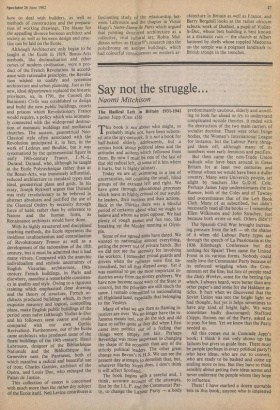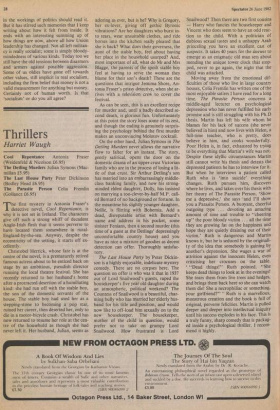Say not the struggle...
Naomi Mitch ison
The Radical Left in Britain 1931-1941 James Jupp (Cass £16)
This book is not about who might, or probably might not, have been suborn- ed into the spy-network. It is not a book for half-baked elderly adolescents, but a serious book about political ideas and the attitudes and actions which followed from them. By now I must be one of the last of that old radical left, so some of it hits where it hurts, but is highly salutary.
Today we are all swimming in a sea of uncertainties, not counting the small, blind groups of the extreme left and right. We have gone through educational processes which leave us highly critical of our would- be leaders, their motives and their actions. Back in the Thirties there was a blissful period of certainty about what we ought to believe and whom we must oppose. We had plenty of rough games and fun too, like breaking up the Mosley meeting at Olym- pia.
Some of our agreed aims have dated. We wanted to nationalise almost everything, getting the power out of private hands. But we did not see the necessity for involving the workers. I remember proud guards and drivers when the railways were first na- tionalised, but all that slipped away. Yet it was essential to get the most important in- dustries away from the money grabbers. We have now become more wary of the State in control, but the priorities are still much the same. I remain committed to nationalising all Highland land, especially that belonging to the Vesteys.
Many of what we saw then as flaming in- justices are over. We no longer have the in- famous means test, nor do the sick and old have to suffer quite as they did when I first came into politics out of a feeling that things were simply not fair. Perhaps Beveridge was more important in changing the shape of the economy than any of the strictly political leaders. The other great change was Bevan's N.H.S. We can see the present day attempts to demolish that, but, whatever Harley Street does, I don't think it will affect Scotland.
The book begins with a careful and, I think, accurate account of the attempts, first by the I.L.P. and the Communist Par- ty, to change the Labour Party — a body
predominantly cautious, elderly and unwill- ing to look far ahead or try to understand complicated outside theories. It ended with the destruction of the two main carriers of socialist doctrine. There were other fringe bodies, the Women's International League for instance, but the Labour Party shrug- ged them off, although many of its members were early feminists and pacifists.
But then came the non-Trade Union radicals who have been around in Great Britain for at least two centuries and without whom we would have been a duller country. Many were University people, set alight by teachers like G.D.H. Cole.
Perhaps James Jupp underestimates the in- fluence, both of the Coles and of Tawney and overestimates that of the Left Book Club. Many of us subscribed, but didn't necessarily read all the books — I remember Ellen Wilkinson and John Strachey, just because both wrote so well. Others didn't!
The Spanish Civil War brought increas- ing pressure from the left — oh the shame of it when old Labour Party types sat through the speech of La Passionaria at the 1936 Edinburgh Conference but did nothing for Spain! Then came the United Front in its various forms. Nobody could really love the Communist Party because of its enforced wriggling when the Corn- mintern set the line; but lots of people read the Daily Worker, some for the betting tips which, I always heard, were better than any other paper's and some for the Haldane ar- ticles. It hurt when we discovered that the Soviet Union was not the bright light we had thought, but yet it helps sometimes to have any kind of bright light. We were sometimes badly discouraged; Stafford Cripps, thrown out of the Party, asked us to pray for him. Yet we knew that the Party needed us.
All this comes out in Comrade Jupp's book; I think it not only shows up the failures but gives us guide lines. There must be people (perhaps in every political party?) who have ideas, who are out to convert, who are ready to be bashed and come up smiling more or less. But they have to think sensibly about getting their ideas across and never underrate the people whom they hope to influence.
There! I have marked a dozen quotable bits in this book; anyone who is interested in the workings of politics should read it. But it has stirred such memories that I keep writing about how it felt from inside. It ends with an interesting summing up of how things are now, above all how Union leadership has changed. Not all left militan- cy is really socialist; some is simply bloody- mindedness of various kinds. Today too we still have the old tensions between disarmers and armers against possible aggression. Some of us oldies have gone off towards other values, still implicit in real socialism, including the firm belief that money is not a valid measurement for anything but money. Certainly not of human worth. Is that 'socialism' or do you all agree?























































 Previous page
Previous page